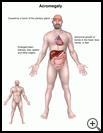
Acromegaly (Excess Growth Hormone)
________________________________________________________________________
KEY POINTS
- Acromegaly is a rare disorder in which your body makes too much growth hormone.
- Acromegaly can physical changes, but can also cause other health problems such as diabetes, high blood pressure, heart disease, and colon cancer.
- Acromegaly can be treated with medicine, radiation therapy, or surgery.
________________________________________________________________________
What is acromegaly?
Acromegaly is a rare disorder in which your body makes too much growth hormone. Growth hormone affects the growth of all tissues of the body, especially bone. Acromegaly usually affects middle-aged adults.
What is the cause?
Acromegaly is nearly always caused by a tumor of the pituitary gland. Your pituitary gland is located at the base of your brain and makes many different hormones that control many of your body functions. One of the hormones it makes is growth hormone. The tumor causes the release of too much growth hormone. What causes these tumors is not known. The tumors are called benign, because they do not contain cancer cells. Sometimes tumors in other parts of the body cause the pituitary gland to make too much growth hormone.
What are the symptoms?
You may not notice physical changes caused by this disorder for several years. It develops very slowly and often is not diagnosed until middle age.
Symptoms may include:
- Abnormal growth of bones in the head, face, hands, or feet
- Muscle weakness
- Joint pain and limited movement of joints
- Deep or hoarse voice
- Changes in your skin, such as oiliness and more sweating
- Headaches
- Vision problems
- Loss of sex drive
- Sleep apnea, which means you stop breathing for more than 10 seconds at a time many times while you sleep
- Irregular menstrual periods
- Trouble having an erection
People with acromegaly may also develop problems such as:
- Diabetes
- Coronary artery disease, which is a problem with the blood vessels that bring blood and oxygen to the heart
- High blood pressure
- Enlarged heart, kidneys, liver, spleen and other organs
- Colon cancer
How is it diagnosed?
Your healthcare provider will ask about your symptoms and medical history and examine you. You may have one or more of these tests:
- Blood tests
- MRI, which uses a strong magnetic field and radio waves to show detailed pictures of the brain
- CT scan, which uses X-rays and a computer to show detailed pictures of the brain or body
- X-rays
- An echocardiogram, which uses sound waves (ultrasound) to see how well your heart is pumping
How is it treated?
Your treatment will depend on the size and location of your tumor as well as how fast it’s growing. You may need more than 1 type of treatment. Treatment may include:
- Radiation to shrink the tumor
- Surgery to remove the tumor
- Medicines to control the level of growth hormone
Surgery may not lower hormone levels enough. You may always need to take medicines to keep growth hormone levels low. Or you may need to take medicines to keep the tumor from getting bigger. You will need to be checked regularly by your healthcare provider.
How can I take care of myself?
Follow the full course of treatment prescribed by your healthcare provider. Ask your provider:
- How and when you will get your test results
- If there are activities you should avoid and when you can return to your normal activities
- How to take care of yourself at home
- What symptoms or problems you should watch for and what to do if you have them
Make sure you know when you should come back for a checkup. Keep all appointments for provider visits or tests.

